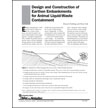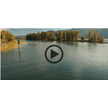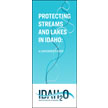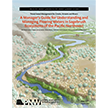Water
Bio-swales for Natural Stormwater Treatment
Stormwater runoff carries lots of pollution from roads, parking lots and other impervious surfaces in urbanized areas. Bioinfiltration swales offer a natural stormwater treatment solution in many...
This bulletin describes the water requirements of the corn crop and explains how to manage a center pivot irrigation system to deliver enough water to the crop at the right times. It focuses on...
Cultural Management of Clearwater Russet Potatoes
The Clearwater Russet is a russet-skinned potato variety developed by the Pacific Northwest Variety Development Program that was released in 2008. Its excellent processing quality helped to...
Design and Construction of Earthen Embankments for Animal Liquid-Waste Containment
Properly designed earthen embankment facilities for animal liquid-waste containment will have adequate storage capacity and be constructed to ensure minimal seepage from the sides and bottom of the...
Covers the biology, detection and management of this invasive aquatic plant. Includes illustrations and descriptions of similar species and estimated costs for various control options, including...
Grass Seeding Forest Roads, Skid Trails, and Landings in the Inland Northwest
Sediments are one of the main nonpoint sources of pollution for lakes, rivers and streams in the Inland Northwest. This eight-page publication (including cover) shares strategies for protecting...
$6 Crayfish are freshwater crustaceans, distantly related to the lobster. Their aquatic impact is significant and fascinating, yet their profile and presence remain mysterious to many Idahoans.
Highway Districts Protecting Clean Water
Stormwater runoff carries lots of pollution from roads, including tire wear dust, drips of oil and other fluids, and plastic trash that's tossed aside. But Idaho's Kootenai County regional highway...
IDAH2O Master Water Stewards Handbook
The official handbook for University of Idaho Extension's Master Water Stewards trained to conduct water quality monitoring in Idaho lakes and streams. The handbook explains the program and...
IDAH2O Playing Cards - Cleaner. Water. Faster.
$3 For grades K-12, this complete deck of playing cards includes grade-specific mini-lessons on watershed science topics in Idaho. Use them in classrooms and out-of-school settings. For more...
Idaho Forestry Best Management Practices Field Guide: Using BMPs to Protect Water Quality
This practical guide will help forest landowners, managers and operators apply Idaho's mandatory forestry BMPs. Contents include (1) the science related to forests, forest hydrology, aquatic...
Introduction to Clean Water Video Series
Want to learn about how you can protect clean water in our lakes, streams and aquifers? This University of Idaho Extension video introduces ways to protect clean water and includes information on...
Iron in drinking water, though harmless, can result in poor tasting unattractive water that stains both plumbing fixtures and clothing. PNW 589 discusses four types of iron in water and seven...
Irrigation Scheduling Using Water-Use Tables
Poor irrigation management can reduce crop yields, degrade crop quality, foster disease and increase pumping costs. This publication has information on using water-use tables to irrigate crops...
Irrigation Systems for Idaho Agriculture
Discusses and compares agricultural irrigation systems: surface systems, sprinkler systems, micro-irrigation and drip irrigation systems. Author: Howard Neibling 8 pages
Master Water Stewards Intro and Welcome Video
This short video welcomes and introduces participants to the IDAH2O Master Water Stewards online version of the classroom portion of the certification workshop. Author, producer: Jim Ekins 3:06
Master Water Stewards Module 1: Introduction to IDAH2O Master Water Stewards
The first of seven educational learning modules for the IDAH2O Master Water Stewards citizen-science water-quality monitoring program covers an introduction to the program, the broader meaning of...
Master Water Stewards Module 2: Key Water-Quality Concepts in Idaho
The second of seven educational learning modules for the IDAH2O Master Water Stewards citizen-science water-quality monitoring program presents a broad, "30,000-foot" view of the key concepts...
Master Water Stewards Module 3: Getting Started as an IDAH2O Master Water Steward
The third of seven educational learning modules for the IDAH2O Master Water Stewards citizen- science water-quality monitoring program focuses on specific things any steward needs to know and do...
Master Water Stewards Module 4: Stream Habitat Assessments
The fourth of seven educational learning modules for the IDAH2O Master Water Stewards citizen-science water-quality monitoring program focuses on habitat assessment, which is conducted only once a...
Master Water Stewards Module 5: Physical and Chemical Stream Assessments
The fifth of seven educational learning modules for the IDAH2O Master Water Stewards citizen-science water-quality monitoring program includes the Physical Assessment: observations of a stream's...
Master Water Stewards Module 6: Stream Biology
In the sixth of seven educational learning modules for the IDAH2O Master Water Stewards citizen-science water-quality monitoring program, you'll complete a Stream Biological Assessment. Stream...
Master Water Stewards Module 7: Standing-Water Assessments, Aquatic Invasive Species
The seventh of seven educational learning modules for the IDAH2O Master Water Stewards citizen-science water-quality monitoring program discusses aquatic invasive species, like non-native algae,...
Mitigating High-Phosphorus Soils
According to Idaho law, livestock operators must make sure their operations are not dumping excess phosphorus into the soil, which could then contaminate surface water or groundwater. This...
This publication summarizes research on the chemistry and movement of agricultural phosphorus in southern Idaho, where calcareous soils and a large supply of dairy manure create a unique situation...
Planning Water Access for Small-Acreage Irrigators
Small acreage landscapes pose unique water-access problems, particularly when they are subdivisions of a larger-acreage property. Improve your navigation of these challenges by learning the basics...
Efficient irrigation management can increase marketable yield while reducing production costs by conserving water, energy and nitrogen fertilizer and while reducing potential groundwater...
Protecting Streams and Lakes in Idaho: A Landowner's Guide
$1 "Riparian" lands along the edges of lakes and rivers are home to many plants that, together, act as a buffer and first line of defense to protect local waterways and lakes. This brochure-style...
Protecting the Source: How Idaho Aquifers Work
Many homeowners and landowners have never had to manage a water well or septic system. This is highly problematic, because mismanagement harms the environment and the health of the private owner.
Protecting the Source: Protecting Drinking Water Wells
Many homeowners and landowners have never had to manage a water well or septic system. This is highly problematic, because mismanagement harms the environment and the health of the private owner.
Public Attitudes about Water Quality in the HUA
The Idaho Snake-Payette Rivers Hydrologic Unit Area (HUA) Water Quality Project was one of 74 projects funded by the U.S. Department of Agriculture implemented in the 1990s to protect and improve...
Riparian Vegetated Buffers Protect Land and Streams
The best and cheapest way to protect your land from eroding away and protect clean water and fish habitat is to maintain streamside and lakeshore vegetation. This University of Idaho Extension...
Scheduling the Final Irrigation for Wheat and Barley
Water management during grain formation is more important than ever, particularly with urban expansion and the subsequent increase in municipal water use. By investigating crop water-use patterns...
Threat-based Management for Creeks, Streams and Rivers
Learn how to rapidly assess and manage water systems in this 66-page fully illustrated guide. Designed for those with little to some knowledge of riparian ecology, this decision-support tool not...
Trees for Southwestern Idaho Landscapes: Selection and Irrigation
To paraphrase a Chinese proverb, it's always a good time to plant a tree, but the dry southwestern Idaho climate might give you second thoughts. This bulletin will restore hope. Learn how to choose...
Urban Farming For Healthy Water
Community-based agriculture and home rain gardens can help protect water with soil conservation and wise water use. In this University of Idaho Extension video, the Gathering Garden stands as a...
Urban Forests and Protecting Lakes and Streams
Urban Forests have a large positive impact on stormwater pollution and volume. In this University of Idaho Extension video, we will explore how cities' street trees can absorb pollution and slow...
Urban Greenspaces for Clean Water
Stormwater runoff carries lots of pollution from parking lots and other impervious surfaces in urbanized areas. Greenspaces offer an opportunity to filter and treat stormwater through natural...
Wastewater Treatment Plants Removing Phosphorous
Small increases in phosphorous, a plant nutrient, can start big changes in aquatic nuisance plant life. This University of Idaho Extension video explains how phosphorous removal by wastewater...
Water and Rural Living: What Idaho Homeowners Need to Know
This guide provides practical and legal information for Idaho homeowners, home buyers and realtors about rural residences and water-permitting processes. Along with explaining the basics about how...
Watering Home Lawns and Landscapes
Wise water use saves homeowners money, enhances property values and supports a watershed. This publication details the liabilities of incorrect watering and the benefits of proper irrigation by...













































